Necessity is the mother of a delicious invention
Gerry Kasten and Joel Barohn are breaking down barriers and redefining how students learn to cook at UBC
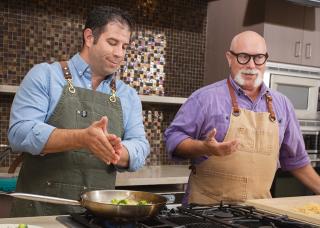
Gerry Kasten and Joel Barohn are breaking down barriers and redefining how students learn to cook at UBC

In spring of 2022, we asked our teaching faculty to tell us who among them were offering innovative learning experiences, environments, and/or introducing new ways of overcoming barriers in their classes. This is part three in a six-part series recognizing teaching faculty at UBC.
Gerry Kasten and Joel Barohn love food. In fact, their background as commercial chefs, combined with their mutual appreciation for the culinary arts, is what brought them to UBC’s Faculty of Land and Food Systems as co-educators in dietetics, cooking, and food theory. So, when the pandemic forced them out of the classroom and into the virtual space, they knew they had to turn up the heat, act fast, and find an innovative way to get students back in the kitchen.
"Many disciplines translate easily to online lectures, but food is not a medium that naturally lends itself to virtual delivery,” says Joel. “A great deal of food literacy and the development of cooking techniques require hands-on practice. You need to build your confidence in the physical space, feel the heat of your pan, and develop muscle memory through repetition.”
“A great deal of food literacy and the development of cooking techniques require hands-on practice. You need to build your confidence in the physical space, feel the heat of your pan, and develop muscle memory through repetition.”
Joel Barohn, Adjunct Professor in Dietetics, Land and Food Systems
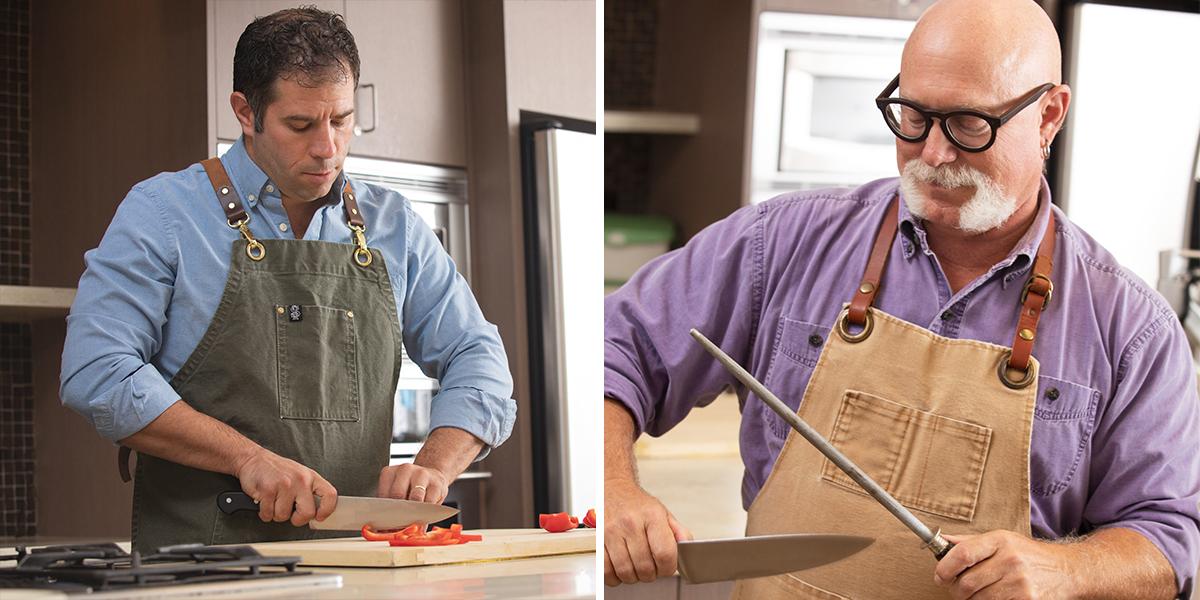
At the start of the pandemic, as UBC course instruction was redirected online, Gerry and Joel tried something new. With the help of an old digital camera and their trusted iPhone, they got to work recording a series of recipes using the classic one-way directional ‘cooking-show’ model – something akin to what you might see from Julia Child, or your favourite Food Network TV host. “It was a bit hodgepodge and boot-strappy,” recalls Joel, “but it was a labour of love for us.”
While this instructional video approach worked for a few weeks, Gerry and Joel realized they needed to find a longer-term solution that would not only better meet their needs as educators, but also the needs of their eager students who were hungry for hands-on practice. After all, these were the students who were on-track to becoming Canada’s next generation of registered dietitians – food and nutrition experts.
“Lofty questions began to percolate in our heads,” remarks Gerry. “How do you safely bring students back to the kitchen during a global pandemic? How do you reintroduce two-way engagement? And, how do you minimize class time without disrupting the integrity of your curriculum?”
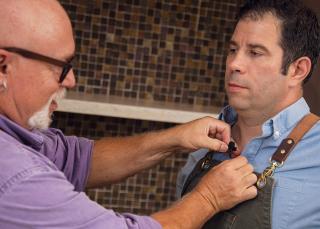
Pre-pandemic, Gerry and Joel taught classes with a 40-students complement, where everyone would be collectively learning, cooking, and congregating around food over a three-hour period. In their new model, and while adhering to rigorous COVID-19 safety protocols and public health requirements, only seven students were invited back into the teaching kitchen at a time – each set up and physically distanced at their own stations – while seven more students logged in remotely via Zoom. Students alternated between attending class online one week, and in-person the next.
Prior to class, students were asked to view Gerry and Joel’s pre-recorded video tutorials and complete the necessary prep work required to obtain a foundational – albeit theoretical – knowledge base. The videos were integral in reducing the amount of class time that was once designated to discussing basic concepts.
“At that time, we also worked tirelessly to enhance the caliber of our video production. We borrowed camcorders, boom stands, and wireless microphones.” Gerry says proudly, “We produced 40 new recipe tutorials with enhanced lighting, editing, captioning, and B-roll footage. We did all of this work ourselves.”
The key to Gerry and Joel’s new mixed-delivery approach was the interactive component at the end of each cooking class.
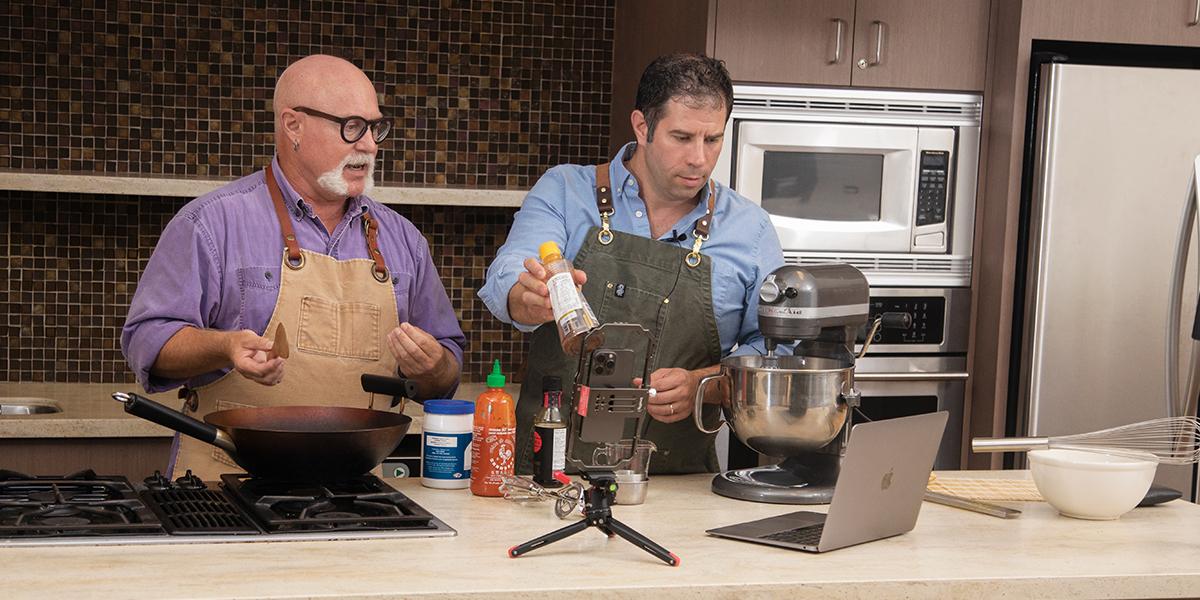
Joel explains, “For those students in the kitchen, we provided careful hands-on instruction. Once the cooking component was completed, we asked students at home to join us over Zoom for a group discussion. With everyone set up at their own computer, students described their cooking experiences to those online. Using Zoom actually enabled us to give each student a bit more of a spotlight and opportunity to chat through what they had learned, tasted, and experienced as part of the process. Peer-to-peer learning at its finest!”
“Once we embraced this new approach to instruction, it started to inform our thoughts about what this could mean for the future – not just the future of this course or the dietetics program, but also food literacy, integrated health, and inter-Faculty collaboration at the university,” says, Gerry.
Gerry and Joel are now considering how upgrades to the kitchen space have the potential to improve accessibility and create an inclusive space for everyone in the UBC community. “We’re interested in breaking down barriers to lab instruction and increasing equitable access to learning by exploring live-streaming capabilities and improving audio-visual and lighting technology.” Joel continues, “My grand vision is to have our kitchen/lab space become a centre of excellence for food nutrition and skill development for all allied health – a chance for other schools, departments, and Faculties, like Medicine, Land and Food Systems, and Nursing, to come together in a unifying space to work through challenges facing overall population health.”
“Once we embraced this new approach to instruction, it started to inform our thoughts about what this could mean for the future – not just the future of this course or the dietetics program, but also food literacy, integrated health, and inter-Faculty collaboration at the university."
Gerry Kasten, Lecturer in Dietetics, Land and Food Systems
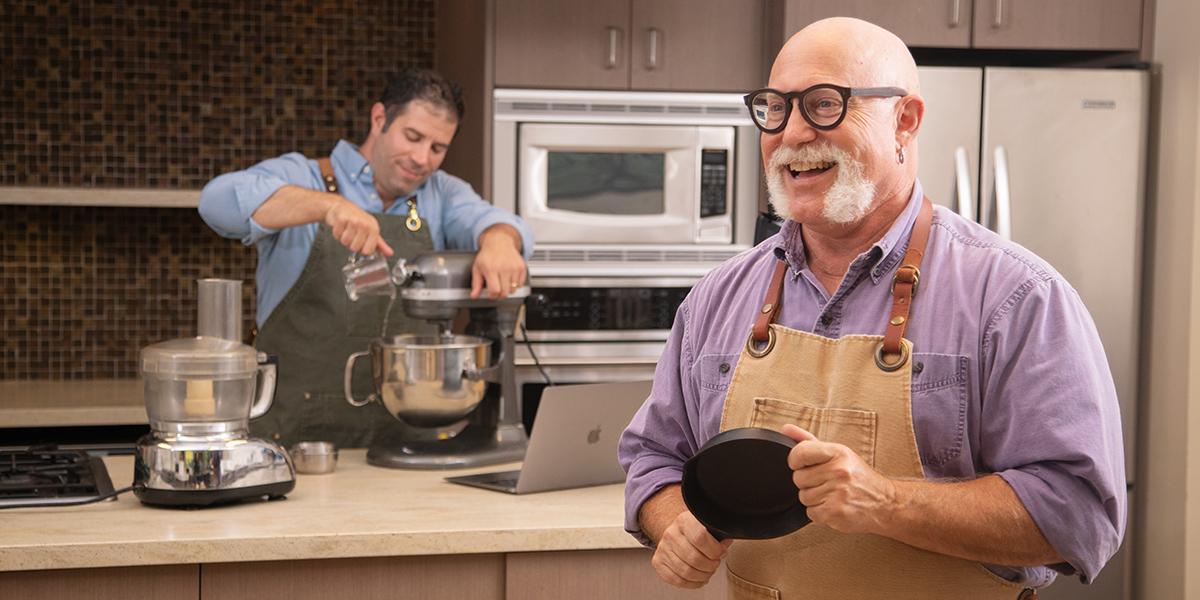
This collaborative shift in thinking has become a foundational ingredient in Gerry and Joel’s approach to teaching and learning. Gerry adds, “And all of this came about because we had to modify both our approach to teaching and our mindset about where teaching can happen.”
Written by Rivka Parris, UBC Internal Communications
October 2022
Accounting. Marketing. Leadership. Lego? How UBC Sauder’s Dr. Kari Marken challenges her Creativity students with purposeful play (Sept. 20)
Science at the crossroads of creativity and ethics: Dr. Robin Young looks at cell biology through a lens of ethics, diversity and inclusion (Sept. 26)
A ‘quiet rumbling’ that led to a visible focus on student humanity: How Katie Lee Bunting’s shift towards values-based teaching transcends the confines of traditional thinking (Oct. 10)
Making the case for open-access law texts: Dr. Samuel Beswick has created Canada’s first online open-access tort law casebook (Oct. 17)
Co-creating a future beyond the classroom: How Dr. Su-Jan Yeo emboldens students to turn urban planning ideas into real-world outcomes (Oct. 24)
Find the latest news, updates, events, and useful dates from across UBC, curated for faculty and staff by Internal Communications.
Access a library of resources from multiple UBC websites, all in one place.